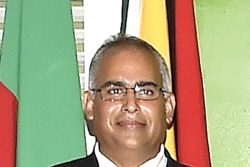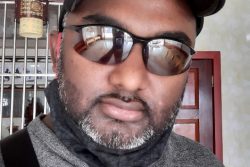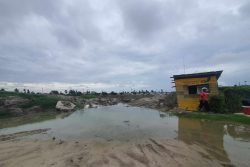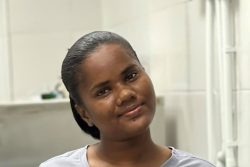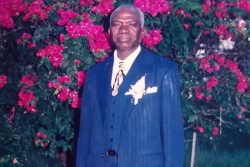Yesterday we reported on Attorney General Anil Nandlall’s complaint against the opposition whose members, with one exception, on Friday absented themselves from a meeting of the Standing Committee for Constitutional Reform. The exception was Mr Raphael Trotman, who attended virtually and who, the AG said, made no contribution to the meeting and left the Zoom platform before its conclusion. The others submitted excuses, although this newspaper’s efforts to contact them about the matter were unsuccessful.
The Constitution Reform Committee of Parlia-ment is chaired by the AG, and the government side consists of Minister of Education Priya Manickchand, Minister of Public Service Sonia Parag, Minister of Culture, Youth and Sport Charles Ramson Jr, and MP Sanjeev Datadin. The opposition complement comprises Opposi-tion Leader Aubrey Norton, AFC Leader Khemraj Ramjattan and MPs Raphael Trotman and Amanza Walton-Desir.
The purpose of the meeting was primarily in order that the opposition could make its written submissions on the composition of the Consti-tutional Reform Commission. This is the body which will consult with wider society and craft the recommendations for reform of our Consti-tution. The last time this foundation document was amended was in 1999-2000, but it has been recognised since then that the changes did not go far enough. According to Mr Nandlall, the government intention is that the Commission should be established by law, and that its structure would be similar to what obtained in 1999-2000. At that time 50% of the members came from the government and opposition, and 50% from civil society groups.
We quoted him as saying that he had tabled the government’s proposal, and that the 50% quota of civil society organizations would include the labour movement, the Private Sector Com-mission, the religious organizations, the Guyana Bar Associations, farmers’ organisations, and organizations representing women as well as youth. The Chair, he said, would be appointed by the President “in the exercise of his own deliberate judgment.”
All of this would then be put into a Bill with other necessary provisions added, including the terms of reference, the financing arrangements and the procedural requirements. After discussions in the committee, it would then be taken to “our respective principals” for approval, and he expressed the hope that there would be consensus on it.
Where the civil society organizations the AG listed are concerned, it might be noted that while they included most of those on the 1999 Com-mission, the representative for indigenous peoples was omitted. Nowadays there is the National Toshaos Council, which did not exist in 2000. Whether this omission was deliberate or an oversight is not clear.
Whatever the case, more than twenty years on from our last excursion in relation to this exercise the definition of civil society remains very limited. In a secular society why does a constitutional commission have to include religious organizations, for example, which is not the same thing as to say they should not all be consulted by the Commission and their views listened to. Or why are there farmers’ organisations, rather than other working groups – or was that just a way to ensure that rural sectors had representation?
Cities like Georgetown and its environs, perhaps represent approaching one quarter of the population of the country, but urban areas do not qualify for representation on the Commission. This is not to suggest in any sense that they should be there, it is merely to point out inconsistency in the categorisation of groupings. Perhaps Mr Nandlall would argue that union representation would cover urban inhabitants, although one would have thought they would encompass only a small minority of them. Similarly, there is the case of academics. Why is no one representing them, for example? Is it really the case that there is no one among that group who could contribute anything?
One can imagine that the government would be resistant to accepting any of the newly formed groups pushing for constitutional reform; they have already vilified them in no uncertain terms. But part of the problem lies in the fact that Mr Nandlall is restricting himself to ‘organisations’ rather than seeking out in addition some knowledgeable individuals outside those categories who could bring a fresh perspective to our constitutional dilemmas. And some of those belong to the much maligned groups. As it is, in terms of individuals there are still quite a few citizens around who have intelligently monitored our evolution from 1992 onwards, particularly where the electoral system is concerned.
The habit in this country on both sides of the aisle has always been to believe that constitutional matters are essentially a legal issue. Perhaps that is why the parliamentary standing committee members are all attorneys-at-law, with the sole exception of Mr Norton. The problem is that they are not a purely legal issue; elsewhere they are seen equally as a question of political philosophy, inter alia, although in the absence of such a tradition locally they become primarily a legal matter by default. What can override everything here, however, including the legal aspects, is unvarnished political self-interest, something which is a particular danger in our current circumstances.
The AG was robust in his chiding of the opposition members for not attending the meeting, although since consensus is essential on constitutional questions, he should rein in his condemnations for the time being and allow a little space. It is clear the opposition have not yet put their minds to the question of the composition of the proposed Commission, and it is equally clear that they need to do so if they are serious about representing their constituents. We need reform, and it for them to do their part to ensure it becomes a reality.
The pattern has traditionally been that constitutional reform is only seen as necessary when a party is in opposition. That began with Dr Cheddi Jagan, who expressed a commitment to the reform of Burnham’s 1980 constitution, which to all intents and purposes had been illegally imposed on the country. When he acceded to office, however, he appeared quite at ease with it. It was Mr Ralph Ramkarran who in his column two months ago reminded readers about the Herdmanston Accord which had brought to an end the street demonstrations of 1997. It reduced the term of Janet Jagan’s government and provided for constitutional reform.
He went on to relate that the PNC had not indicated any great desire for constitutional change, while the PPP’s priorities lay elsewhere. The idea, he suggested, may have come from the ‘Three Wise Men’, ie Messrs Shridath Ramphal, Alister McIntyre and Henry Forde.
He adverted, too, to the fact that the Constitu-tional Reform Commission’s recommendation on the setting up of various commissions, was ignored in the case of the Human Rights Commission, which is yet to be established. “Not a peep,” he wrote, “has been heard from the Opposition or civil society about this egregious omission.”
The opposition itself stymied a unique opportunity for constitutional reform when it was in office, although it had made it one of the mainstays of its manifesto. Once again, as the AG correctly pointed out, all parties, including the opposition, have made constitutional reform a manifesto commitment, although as history has shown that does not necessarily mean very much. Mr Nandlall was quoted as saying: “So we have decided, unfortunately, to move in the direction that we have today. And if the opposition is not prepared to come on board, well then that’s quite unfortunate. All we can do at this stage is to demonstrate to the public demonstrate to the people our willingness, our preparedness to deliver on what we have promised… the government can’t allow that to cripple us and prevent us from moving the country forward.”
There is no point in taking this approach. The reality is that they cannot ‘move the country forward’ on the constitutional front without the cooperation of the opposition. In the absence of that there will be no progress. However difficult the AG feels the opposition is being, he still has to cast around for a formula which will bring them into discussions, unless he just wants to be able to say that they wouldn’t collaborate so the Constitution can’t be reformed.
As for the opposition, it is in its interest and that of the people of Guyana to ensure there is reform; they should not allow a situation to develop whereby the government says it can’t be done because the opposition will not work with them. The impression is being given that APNU+AFC is being distracted by all kinds of side issues; it is time they started serious work on a matter which could have some real impact on the politics and development of this country.
